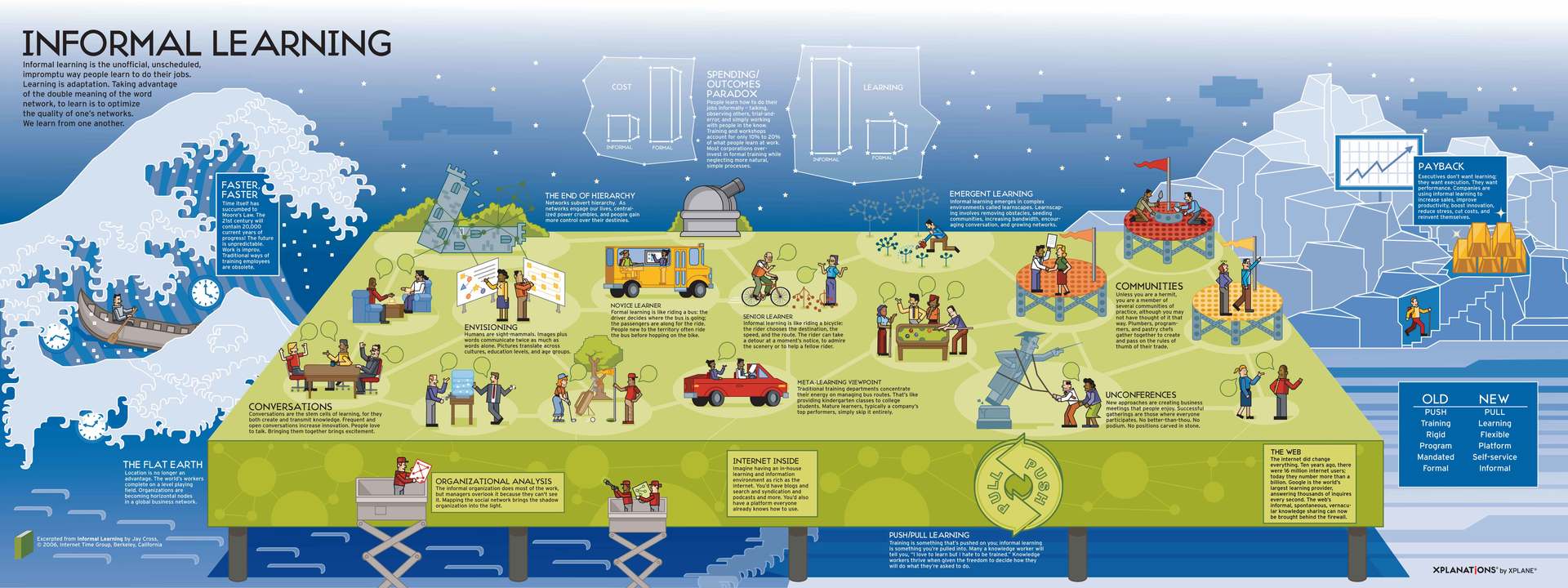This is the age of the "knowledge worker" - there's no question about it! Companies, both big and small, invest vastly in delivering workers the knowledge they require to do their jobs successfully. The more knowledge a worker assimilates, and the quicker he/she absorbs it, the more competitive and profitable will he/she become for the company.
Informal learning - Not a new concept
While companies spend a huge part of their personnel development budget on "formal" learning, such as training courses and workshops, a surprising number of students that come out of those sessions are unprepared to put that learning into practice. However, once they are in the workforce, they use informal learning techniques, including:
- Observing other colleagues
- Asking senior employees
- Experimenting on their own
- Doing their own additional research to fill in the gaps to perfect the skills they need in the real world.
This informal way of teaching/learning has been around for a while, where knowledge has been handed down from one generation to another. Even during the days of the Industrial Revolution, the Apprenticeship system was essentially an informal learning process that every Supervisor and Shop Foreman underwent before they got to where they were.
How to leverage Social Media as learning tools
Today's informal learning environment has many of the same characteristics as the system of the bygone ages. However, with the proliferation of the Internet, learners are turning to social connections and tools to learn informally. The following are some ways that companies can leverage Social Media platforms in informal learning settings:
- LinkedIn
This is a platform for aggregating professionals and peers, and then connecting with them through Social Media. Knowledge workers are much more likely to learn by interacting informally with their peers in such settings. Most professionals value tips/techniques and learning nuggets supplied informally by their peers more than those offered by a lecturer standing in front of a classroom.
- Chat/Messaging
Formal courses won't provide answers to every work situation. Tools like Yahoo Messenger, MSN Messenger (Skype) and Google Talk (Hangouts) can become great informal learning resources for employees to use in order to get quick responses to desperately needed work-related questions. They are quicker than sending an email to a Training Officer, and more effective than a phone call to a supervisor.
- YouTube
Most learning takes place by "seeing", and employers can take advantage of that by creating short videos about work-related situations, and posting them on YouTube for employees to access and learn. YouTube also hosts a wealth of instructional as well as "How To" videos that may apply to many organizational situations.
- Facebook Groups
Almost two-thirds of the world's population is on Facebook, and that offers a unique opportunity to use this social platform as an incredible informal learning tool. While most employees "should" be using formal company platforms (like websites and email) to stay "plugged in" to major corporate developments, a surprising number of knowledge workers are more connected to Facebook. Setting up Facebook Groups, and using them to stimulate discussions and debates can be a great informal way to deliver much needed learning to broad and dispersed groups of employees.
- Twitter
Tweeting has now become a standard way to provide instant updates and feedback on global events. Companies can use this medium effectively as an integrated informal learning tool, by providing ongoing commentary on important corporate initiatives. Tweets from known Subject Matter Experts (SMEs) will help new-comers in the field pick up invaluable insight on the situation in progress - more so than any formal classroom lecture can offer.
- Blogs
Each time that a company releases a new product or service, it might be difficult (especially if the audience is global) to bring every employee into a classroom/training center to disseminate information to them. Blogs can not only be used effectively in such situations, but can also be configured to stimulate discussion, elicit feedback and provoke comments about them. Unlike a formal email system, feedback on blogs can also be anonymous, which can often be more meaningful than comments/feedback received through formal systems.
While some of these Social Media tools can be used to achieve multiple learning objectives, most are excellent at delivering specific informal learning experiences. YouTube, for instance, has a niche in delivering video content, while Messaging can be leveraged for rapid communication exchanges. Recognizing which tools to use, and what type of learning content to deploy using them is vital to successful use of Social Media in informal learning.
How to Strike the right balance
When it comes to ensuring effective informal learning, There are certain strategies that should be embraced by all organizations. However, there has to be a balance struck on how much latitude to give informal learners. Some points to consider when striking that balance include:
- Standardization
Recognize that not all learners will embrace the same set of Social Media tools as learning aids. Companies will need to introduce standards for their tools.
- Expertise
Realize that "expertise" offered via Social Media learning tools is often difficult (sometimes impossible) to verify.
- Security
If public domain Social Media learning tools are being made available to company employees, then security must be a concern that should be addressed.
- Oversight
Should there be oversight of an employee's access to such tools? Or, will the company go by the "honor system" and trust that employees won't abuse the use of these tools?
Building Social Media learning policies is the best way to proactively address all of the above concerns. However, the key to creating and implementing such policies is "consultation". Without adequate consultation and buy-in from employees, companies have no hope of successfully integrating Social Media tools in support of informal learning.
If you want to learn more about informal learning and leveraging social media to support collaborative eLearning, please check my Instructional Design for ELearning: Essential guide to creating successful eLearning courses book. This book is also available in Spanish (http://amzn.to/1scrzBU)
Originally published on November 7, 2014








Social Media Tools - Taking Informal Learning To New Heights
This is the age of the "knowledge worker" - there's no question about it! Companies, both big and small, invest vastly in delivering workers the knowledge they require to do their jobs successfully. The more knowledge a worker assimilates, and the quicker he/she absorbs it, the more competitive and profitable will he/she become for the company.
Informal learning - Not a new concept
While companies spend a huge part of their personnel development budget on "formal" learning, such as training courses and workshops, a surprising number of students that come out of those sessions are unprepared to put that learning into practice. However, once they are in the workforce, they use informal learning techniques, including:
This informal way of teaching/learning has been around for a while, where knowledge has been handed down from one generation to another. Even during the days of the Industrial Revolution, the Apprenticeship system was essentially an informal learning process that every Supervisor and Shop Foreman underwent before they got to where they were.
How to leverage Social Media as learning tools
Today's informal learning environment has many of the same characteristics as the system of the bygone ages. However, with the proliferation of the Internet, learners are turning to social connections and tools to learn informally. The following are some ways that companies can leverage Social Media platforms in informal learning settings:
This is a platform for aggregating professionals and peers, and then connecting with them through Social Media. Knowledge workers are much more likely to learn by interacting informally with their peers in such settings. Most professionals value tips/techniques and learning nuggets supplied informally by their peers more than those offered by a lecturer standing in front of a classroom.
Formal courses won't provide answers to every work situation. Tools like Yahoo Messenger, MSN Messenger (Skype) and Google Talk (Hangouts) can become great informal learning resources for employees to use in order to get quick responses to desperately needed work-related questions. They are quicker than sending an email to a Training Officer, and more effective than a phone call to a supervisor.
Most learning takes place by "seeing", and employers can take advantage of that by creating short videos about work-related situations, and posting them on YouTube for employees to access and learn. YouTube also hosts a wealth of instructional as well as "How To" videos that may apply to many organizational situations.
Almost two-thirds of the world's population is on Facebook, and that offers a unique opportunity to use this social platform as an incredible informal learning tool. While most employees "should" be using formal company platforms (like websites and email) to stay "plugged in" to major corporate developments, a surprising number of knowledge workers are more connected to Facebook. Setting up Facebook Groups, and using them to stimulate discussions and debates can be a great informal way to deliver much needed learning to broad and dispersed groups of employees.
Tweeting has now become a standard way to provide instant updates and feedback on global events. Companies can use this medium effectively as an integrated informal learning tool, by providing ongoing commentary on important corporate initiatives. Tweets from known Subject Matter Experts (SMEs) will help new-comers in the field pick up invaluable insight on the situation in progress - more so than any formal classroom lecture can offer.
Each time that a company releases a new product or service, it might be difficult (especially if the audience is global) to bring every employee into a classroom/training center to disseminate information to them. Blogs can not only be used effectively in such situations, but can also be configured to stimulate discussion, elicit feedback and provoke comments about them. Unlike a formal email system, feedback on blogs can also be anonymous, which can often be more meaningful than comments/feedback received through formal systems.
While some of these Social Media tools can be used to achieve multiple learning objectives, most are excellent at delivering specific informal learning experiences. YouTube, for instance, has a niche in delivering video content, while Messaging can be leveraged for rapid communication exchanges. Recognizing which tools to use, and what type of learning content to deploy using them is vital to successful use of Social Media in informal learning.
How to Strike the right balance
When it comes to ensuring effective informal learning, There are certain strategies that should be embraced by all organizations. However, there has to be a balance struck on how much latitude to give informal learners. Some points to consider when striking that balance include:
Recognize that not all learners will embrace the same set of Social Media tools as learning aids. Companies will need to introduce standards for their tools.
Realize that "expertise" offered via Social Media learning tools is often difficult (sometimes impossible) to verify.
If public domain Social Media learning tools are being made available to company employees, then security must be a concern that should be addressed.
Should there be oversight of an employee's access to such tools? Or, will the company go by the "honor system" and trust that employees won't abuse the use of these tools?
Building Social Media learning policies is the best way to proactively address all of the above concerns. However, the key to creating and implementing such policies is "consultation". Without adequate consultation and buy-in from employees, companies have no hope of successfully integrating Social Media tools in support of informal learning.
If you want to learn more about informal learning and leveraging social media to support collaborative eLearning, please check my Instructional Design for ELearning: Essential guide to creating successful eLearning courses book. This book is also available in Spanish (http://amzn.to/1scrzBU)
Read Also